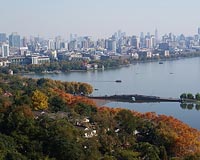 |
Beijing (AFP) May 19, 2011 China's top Tibetan official said Thursday "the door was open" for the return of the exiled Dalai Lama, but repeated its charge that the spiritual leader was a separatist bent on Tibetan independence. In China's first high-level comment since the Dalai Lama retired in March as head of Tibet's government-in-exile, Padma Choling said the spiritual figure was welcome to return to Tibet as long as he ended his separatist activities. "If he wants to come back, the door to China is always open," Choling, Tibet's highest-ranking official, told reporters. "If the Dalai Lama really does retire as he says he has, if he stops his separatist activities, stops disrupting the stability of Tibet and really concentrates on Buddhism, then this will be good for Tibet," he said. "The key is if he really gives up Tibetan independence." China has made similar statements before but Tibet-watchers believe Beijing will not allow his return due to its potential for causing political instability in tense Tibet. China has for years insisted the Dalai Lama wants to establish an independent Tibet, charges the 1989 Nobel laureate has long denied, saying he only seeks "meaningful" autonomy for his Himalayan homeland. Following his March retirement, Tibetan exiles elected Harvard academic Lobsang Sangay, 43, as their new prime minister and handing him the daunting task of assuming the political duties of the Dalai Lama, a global icon. Beijing has long been seen as playing a waiting game, believing that the Tibetan exiled movement will splinter and collapse after the eventual death of the 75-year-old Buddhist monk. Choling, who was speaking on the 60th anniversary of China's "peaceful liberation of Tibet," further accused the Dalai Lama of seeking to restore the Tibetan theocracy that existed for centuries before China's 1951 takeover. "Since he went into exile in 1959, he has never done anything good for Tibet, everything he has done since he left is to struggle for the restoration of feudal serfdom," he said. He further reiterated Beijing's stance that the exiled Tibetan government was "an illegal organisation," and said any future negotiations on the Dalai Lama's return to Tibet would be with the Buddhist leader and not the exiled government.
earlier related report "We hope that the Vatican can be clearly aware of the fact that China practises freedom of religious belief and of the continuous development of China's Catholic Church," foreign ministry spokeswoman Jiang Yu told reporters. Jiang added that Beijing hoped the Vatican would "create conditions for the development of China-Vatican relations through concrete actions". On Wednesday, the pontiff called on Catholics across the world to pray that Chinese bishops would refuse to split from Rome, despite what he called "pressure" from the country's communist authorities. "We know that among our brother bishops there are some who suffer and find themselves under pressure in the exercise of their episcopal ministry," Benedict XVI said at his weekly general audience in St. Peter's Square. "To them, to the priests and to all the Catholics who encounter difficulties in the free profession of faith, we express our closeness," he said. The pope called for prayers for the Church in China, "that it remain one, holy and Catholic, faithful and steadfast in doctrine." "Chinese Catholics, as they have said many times, want unity with the universal church, with the successor to Peter," he said. The Chinese Patriotic Chinese Association -- which controls the state-backed church -- does not acknowledge the pope's authority and is fiercely opposed to clergy in China who are loyal to the Vatican. The Vatican and China have not had formal diplomatic ties since 1951, when the Holy See angered Mao Zedong's Communist government by recognising the Nationalist Chinese regime as the legitimate government of China. The Nationalists fled to Taiwan after losing a civil war with the Communists in 1949. As such, the Vatican is one of the few states that recognise the island, which Beijing considers part of its own territory. Relations between the Vatican and the Chinese church became increasingly tense following the ordination of a priest in Chengde last November without the pope's blessing. Official tallies put the number of Catholics in China at 5.7 million, including members of both the unofficial and official churches. Human rights groups say that those who remain loyal to the Vatican often suffer persecution, with detentions of bishops common.
Share This Article With Planet Earth
Related Links China News from SinoDaily.com
 In China, some new cities are ghost towns
In China, some new cities are ghost townsKangbashi, China (AFP) May 19, 2011 In China's Inner Mongolia, Kangbashi district offers residents "new modern" living, with tree-lined streets, shiny apartment buildings, vast parklands, restaurants and even a motor racing track. But seven years after construction workers broke ground on the arid plateau, most of the apartments appear empty and the wide streets are almost deserted - earning Kangbashi the tag of "ghost city". ... read more |
|
| The content herein, unless otherwise known to be public domain, are Copyright 1995-2010 - SpaceDaily. AFP and UPI Wire Stories are copyright Agence France-Presse and United Press International. ESA Portal Reports are copyright European Space Agency. All NASA sourced material is public domain. Additional copyrights may apply in whole or part to other bona fide parties. Advertising does not imply endorsement,agreement or approval of any opinions, statements or information provided by SpaceDaily on any Web page published or hosted by SpaceDaily. Privacy Statement |